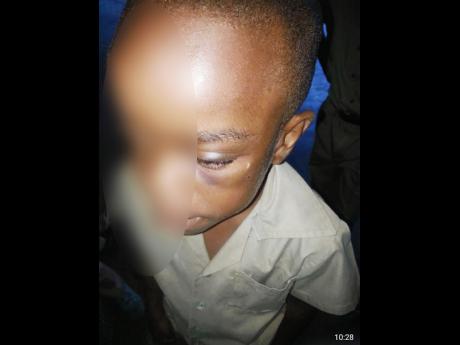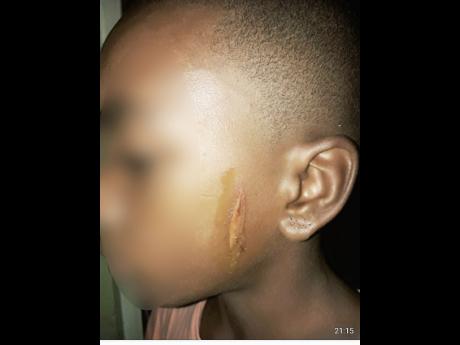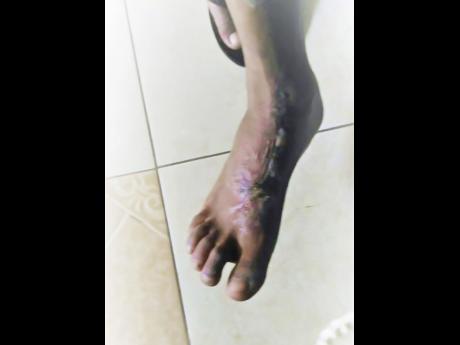Savagery! - Scores of Jamaican children bearing the scars of brutal beatings; Mothers are the main ones carrying out the abuse
The cruel and inhumane treatment meted out to some of Jamaica’s children was brought into sharp focus recently when a video went viral of a St Thomas mother beating her child with a machete.
But a Sunday Gleaner probe into the dark side of parenting in Jamaica has revealed that the action of the nearly naked machete wielder pales in comparison to the punishment some children are forced to endure from the persons who are supposed to protect them.
Children, some as young as six months old, have been burnt with hot irons, chopped with knives or machetes, soaked with boiling water, beaten to within inches of their lives with electrical cords.
The Sunday Gleaner findings were confirmed by the Child Development Agency (CDA), which identified mothers as the main perpetrators of the dastardly acts.
According to the CDA, it is extremely concerned about the level of physical abuse being meted out to our children and the types of implements being used.
“From January to September of this year, our Investigations Unit received 10,267 cases. While in 2016, the unit received 12,804. Of the number of cases received since the start of 2017, there is an increase in physical abuse,” Rosalee Gage-Grey, chief executive officer for the CDA, told The Sunday Gleaner.
“According to (OCR) Office of the Children’s Registry 2015 Statistics, 3,639 children were reported as being physically abused, an increase from 3,214 in the previous year.
“Based on reports received by the CDA’s Investigations Unit during the period 2016-2017, there is an overall increase which is at alarming levels,” added Gage-Grey, as she argued that with just over two months before 2017 ends the numbers are set to surpass those for last year.
The CDA head said when her investigators visit the scenes of abuse, they are dismayed, having seen the types of scars on the bodies of children.
“Guided by the Physical Abuse Chart, we are able to identify what type of implement is used to cause injury to a child,” said Gage-Grey.
NOT RIGHT!
“We have seen pictures of babies with scars on every inch of their skin, cuts on faces, arms, legs, and this is not right,” Gage-Grey added, as she declared that the CDA is determined to see the perpetrators of these acts brought to justice.
According to the CDA, children are beaten for not acting on commands quickly enough, purchasing the wrong items when sent to the shop by parents, for not doing homework and for being too noisy.
In other cases, the reasons for the punishment are more clandestine and repulsive.
“There are also the social issues such as the single-parent struggles. Some parents may be going through financial or emotional issues where one parent may have left the home and so they are taking it out on the child,” explained Rochelle Dixon, public relations and communications manager at the CDA.
She said CDA investigators, who are tasked with removing the children from these abusive homes, find themselves deeply traumatised in some cases.
In the meantime, Dr Patrece Charles, counselling psychologist and CEO of the Phoenix Counselling Centre in Kingston, said social media is helping to peel back the shrouds of a culturally accepted practice in Jamaica.
“There is a culture of corporal punishment in Jamaica, (people say) ‘me granny did it, my grandparents did it and I am OK’. We are not taking into consideration that the things children are exposed to now are very different from then,” she said.
“A lot of the parents who abuse their children are also victims of abuse; either in their current relationships, past relationships or abused while they were children,” said Charles.
CYCLE OF ABUSE
“The cycle of abuse they are exposing their children to was taught. They don’t know any other way to discipline or manage their emotions,” she added.
Dr Beverley Scott, child and family therapist at the Family and Parenting Centre in Montego Bay, said many Jamaicans who quickly praise being be a t en and b r and i s h s c a r s f r om their parents as life lessons may be suffering serious psychological trauma.
“It can’t make them better. Maybe they have survived and are living now, but these children have come out with scars. They have come out with a certain kind of personality,” said Scott.
“They are hardened people because of how their parents treat them, and so they don’t care to die, because it is just one life. How they feel about life doesn’t matter. They have gone through it with their parents, and so if anything happens, they are not afraid to die, and they don’t care if someone is hurt or if they are hurt themselves,” added Scott.
TOXIC STRESS
That is a concern shared by the CDA. “Research over the last two decades confirms that children carry the effects of childhood experiences into adulthood. The challenges they face in school, life and ultimately the state of their health are often the symptoms of toxic stress.
“Toxic stress, unlike manageable stress, refers to the long-term changes in brain architecture and organ systems that develop after extreme, prolonged and repeated stress goes untreated. Exposure to (these) may put our children at higher risk of learning difficulties, emotional problems, developmental issues and long-term health problems,” said the CDA.







